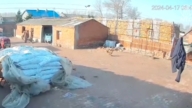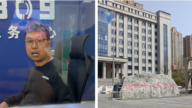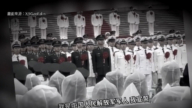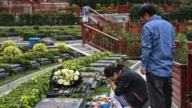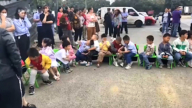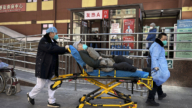【新唐人2014年04月14日讯】近年来,中国大陆医患冲突愈演愈烈,恶性杀医案件频发,为“推进医患交流互动,增进医患互信”,日前,北京21家市属医院向社会招募所谓“守护天使”的志愿者,从事患者陪伴、安慰等服务。专家认为,医患冲突是现行医疗体制的问题,只靠调解不可能得到缓解。
近年来,中国各地伤医、杀医事件不断增多,今年年初,中共当局加强了医院内的安保强度。3月,最高人民法院院长周强宣布,今年将加大对“医闹”的打击力度。
中共总书记习近平和最高法院民一庭副庭长程新文也声言,要严惩“医闹”和暴力伤医的犯罪行为,并追究刑事责任。
但是暴力伤医事件并没有因此减少。3月底,45岁的男子王方立,在江苏省徐州市丰县协和门诊部接受“包皮环切术”后,做输液抗菌治疗,因不满治疗效果和过高的医疗费,4月8号持刀把医生单二辉刺死。
为此,北京21家市属医院97个岗位,准备招募1573名“守护天使”志愿者,定期或者长期从事患者陪伴、心灵抚慰等志愿服务工作。说是为了推进患者、医务工作者、医院管理者交流互动,增进医患之间的互信。
不愿透露名字的广东胡医生认为,招募“守护天使”志愿者,可能短期有效,但长期效果不乐观。
广东医师胡医生:“医患关系的话,现在社会上谴责医者的人比较多一些,实际上医院里面是黑幕重重, 我记得钟南山院士在两会的时候也说到,中国医疗不靠技术靠开药,这种现象是广泛存在的。”
美国国家卫生研究院的专家胡宗义指出,医生也在想办法捞钱,这让患者不再相信医生。
美国国家卫生研究院专家胡宗义:“看到别人挣钱多了,医生也想别的办法,那些红包方方面面的、回扣等各种各样的办法都出来了,有些付得起的人他可以付,他无所谓,那些弱势群体,他没有钱,他付不起,但又得找好医生他怎么办?他当然就心理不平衡了,这矛盾就来了。”
南京“东南大学”法学教授张赞宁指出,中共当局对医院的拨款很少,90%以上靠医院赚钱养活医生。
南京东南大学法学教授张赞宁:“所以医生他必须要多开药、多检查,这个医德、医风就明显滑坡,这样就激化医患矛盾,群众就看病难、看病贵,这个问题就越来越突出,因为我们国家缺少一个负责任的政府。”
中共人大代表、浙江台州医院院长陈海啸曾在去年两会指出,改革开放后,医疗市场一味追求“经济医疗”,从而使老百姓的医疗负担变得非常沉重。医疗行业的垄断性以及一些医生职业素养的下降,共同把医疗费用抬高,导致患者看病难、看病贵。
张赞宁指出,中共当局“行政开支”全世界第一高,但对于医疗经费投入的相当少。
张赞宁:“大量的钱都用于给官员们买车、房子自己享受,这样就造成老百姓由于他看病难、看病贵,就会把本来应当是同国家、同政府之间的矛盾,就转嫁到医生的头上,把这些不公平的现象,认为都是医生造成的,实际上政府投入太少。”
早在2009年1月,已经通过“新医改”方案,计划3年投入8500亿,对13亿人进行“全覆盖”照顾。可是,医疗资源配置的扭曲并未改善,医患冲突逐年加剧。
中国医师协会顾问律师邓利强向媒体介绍,早年医生被打案件平均每年1万1000多起,2009年起逐步上升。中共卫计委统计,仅去年就发生约7万起医疗纠纷。
中共人大代表、肺移植专家陈静瑜公开在媒体感叹,身为一名外科医生,压力真的很大,连做梦都经常被患者及家属误解和纠缠。
她说,医护行业本是受人尊重的行业,但近年来随着医患矛盾不断增多,并经常出现暴力事件,使医疗行业的吸引力大为降低,甚至被一些人看做危险的职业。
采访编辑/李韵 后制/李勇
Doctor-Patient Conflict depends on the conciliation of “Angel Guard"
In recent years, doctor-patient conflict is
increasingly developing so that cases
of cruelly killing doctors frequently occur.
In order to “Promote interactive communication
between doctors and patients,
and enhance reciprocal trust", in recent days,
21 Beijing Municipal hospitals recruited
so called “Angel Guard" volunteers
for accompanying and consoling the patients.
Experts think, conflict between doctors and patients
is an issue due to current medical institutions
and is impossible to relieve only by conciliation.
In recent years, cases of hurting
and even killing doctors across China are increasing.
At the beginning of this year,
the Chinese Communist Party (CCP) Authority strengthened
safeguards within hospitals.
In March, the President of the Supreme People’s Court
Zhou Qiang announced that this year the powers to deal with
the “Medical Troubler" have been enhanced.
The CCP Head Xi Jinping and the Deputy Chief
of the First Civil Chamber of Supreme People’s Court
Cheng Wenxin both said,
the crime of “Medical Troubler"
and attacking doctors by violence,
will be severely punished
and the penal responsibility of the relevant suspects traced.
However, such responses from the high level do not reduce
the cases of attacking doctors by violence.
At the end of March, a 45 year old man Wang Fangli
received an operation for prepuce postectomy
and then transfusion for antibiotic treatment
in Concord Clinic of Feng County of
Xuzhou City in Jiangsu Province.
But Wang was dissatisfied with the operation’s effects
and high medical cost, so he stabbed
the doctor Shan Erhui to death with a knife on April 8.
In view of such events, 97 positions
at 21 Beijing Municipal hospitals are recruiting 1573
“Angel Guard" volunteers who are expected to
regularly or long-term accompany and console patients.
It is said to promote interactive communication
among patients, medical staff and hospital executives,
as well as enhance reciprocal trust.
Dr Hu from Guangdong Province,
who does want to give his name,
says to recruit “Angel Guard" volunteers might be
useful in the short term, but useless long term.
Dr Hu: “as for the relationship between doctors and patients,
more people blame the doctor.
In fact, there are numerous black areas inside hospitals.
I remember that the Academician Zhong Nanshan said
during Two Major Conference, the medical field in China
sustains itself by selling medicines
rather than medical technologies.
Such a phenomenon is prevalent."
American National Health Institute’s expert Hu Zongyi says,
doctors are managing to make money,
which causes distrust between patients and doctors.
Hu Zongyi: “when seeing others can make a lot of money,
the doctors also invent other ways including
red packet within cash, discounts etc.
Some people can pay, so they do pay
and this is nothing for them.
But those vulnerable groups who have no money and cannot pay,
but have to look for a good doctor, so what can they do?
They of course feel unbalanced inside
and then the conflict arises."
Nanjing-based Southeast University Legal Professor
Zhang Zangning points out, the CCP Authority allocated
limited funds to hospitals. So 90% of hospitals support
the doctors with the money made by hospitals themselves.
Zhang Zangning: “So the doctors had to
give more medicines and more checking procedures.
Medical morality and medical style have
significantly collapsed, which has sharpened
the doctor-patient conflict.
The problem of ordinary people’s difficulty in seeing a doctor
and affording the medical costs
has become more and more outstanding.
Because our country lacks a responsible government."
The CCP’s Representation of National People’s Congress
and the head of Taizhou Hospital in Zhejiang Province
pointed out during last year’s Major Conference,
since reform and open policy was implemented,
the medical service market was only targeting
“economic treatment", which aggravated
ordinary people’s medical burden into a heavy situation.
The monopoly of the medical profession and the degradation
of some doctors’ professional nature, lifts the medical cost
thus leading to the difficulties of a patient in
seeing a doctor and high cost pressure on the patients.
Zhang Zanglin said, the CCP Government has
a No. 1 administrative cost,
but funds the medical field at a much lower level.
Zhang Zanning: “A huge amount of money has been
used for buying cars and properties for officials,
which causes the difficulty and the expense
of seeing doctors for ordinary people.
This is to push the original discontents
towards the government and the CCP on to the doctors,
and to attribute all these unfair phenomena
to the doctors. The truth is too little funding
for the medical field by the Government."
In January of 2009, “New Medical Reform" Scheme
was passed and it was planned to fund 850 billion
in a three year period to “fully cover" a total
of 1.3 billion population.
But, the misallocation of medical resources
has not yet been improved, and doctor-patient conflict
is increasing year by year.
The lawyer of China’s Doctor Association Deng Liqiang
told media, previously cases of attacking doctors
were 11,000. But since 2009, there is an annual increase.
According to the CCP’s Health Ministry statistics data,
in the last year, there were about 70,000 medical dispute cases.
CCP Representative and lung transplant expert Chen Jingyu
said on the media that as a surgeon,
she has a heavy pressure. She was concerned about being
misunderstood and entangled by the patients
and their family members even in dreams.
She says, the medical profession was originally a respected field.
But along with recent years’ increasing incidents
between doctors and patients and
frequent violent incidents, the attractiveness
of the medical field is largely reduced
and even regarded as a dangerous profession.
Interview & Edit/Li Yun Post-Production/Li Yong



